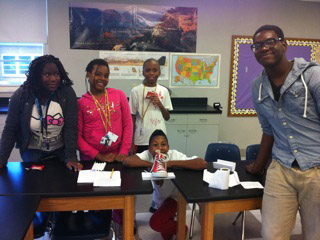Every Tuesday afternoon, an undergraduate from Washington University’s School of Engineering & Applied Science heads back to middle school.
Nick Okafor leads the after-school Young Engineers Club at Brittany Woods Middle School in University City. N’Desha Scott, a sophomore majoring in biomedical engineering, started the club last fall as a way to reach out to middle school students from groups traditionally underrepresented in the science, technology, engineering and math (STEM) fields.

The club is part of the university’s Institute for School Partnership, which works with local school districts to encourage measurable increases in student success through curriculum development, instruction and assessment support and professional development for teachers.
The institute has been supporting STEM activities in elementary, middle and high schools for more than 20 years. Through the institute, Washington University undergraduate and graduate students offer tutoring or after-school interest clubs and enrichment programs at schools throughout the community.
Each week, six or seven Brittany Woods students participate in the Young Engineers Club. Scott developed a curriculum for the semester based on what she is learning in her engineering classes, with some modifications.
“We have to explain it to them on a middle school level, so we really have to know it,” Scott says.
Scott says she created the group out of her interest in teaching and working with kids and in sharing what engineering offers.
“I think it’s important that they are exposed to engineers,” she says. “They hear about doctors and lawyers, but they don’t really hear about engineers. It’s important to show them what an engineering career could do for them. I always try to bring our lesson back to things they use every day, so they can see that engineers have a hand in all of these things.”
Each week, the group has a different lesson and hands-on activity, for which the institute provides supplies. One activity involved building a bridge out of paper that was strong enough to support a shoe. A lesson in speed and velocity allowed students to create rockets with balloons and string. Another lesson in bionics led to students recreating a hand using only cardboard, straws, string, paper and tape.
“We analyzed what nature created and tried to make it with other materials,” says Okafor, a freshman majoring in biomedical engineering. “Then we had a group discussion about what they would fix to make it work better. It’s great to see their minds going.”
“We try to get them to think about things such as what makes a hand move,” Scott adds. “This really challenges their way of thinking,” she says.
Scott and Okafor want to reach the whole person, so they also work to build students’ self-esteem with a positive affirmation:
I can do whatever I set my mind to do.
I can be whatever I set my mind to be.
I choose to learn, to succeed, and to help others.
Every day and in every way, I get better and better.
I am unique, I am awesome, and I believe in me.
The students have memorized the affirmation, and each week, a different student leads the group in reciting it, says Andrea Holmes, community and school liaison with the institute.
“This club is not just for doing activities, but for helping the students to identify their strengths and what the possibilities are,” Holmes says. “That is so important at this age level. The Washington University students have given them a sense of empowerment through the time they have spent with them.”
Holmes says feedback from Brittany Woods administrators has been very positive and that Scott and Okafor have been an invaluable resource.
“I know the Washington University Engineering curriculum is extremely intense,” she says. “I can’t express enough how wonderful it is that N’Desha and Nick are willing to sacrifice their time to pay it forward and to give to the next generation. They truly have a heart for these students.”
Although a class scheduling conflict kept Scott from leading the club this spring, she hopes to return in the future.
“Passing the torch of this club, my original idea, to Nick this semester is leaving a small legacy, a sharing of my love for science and engineering, some evidence of an impact,” Scott says.